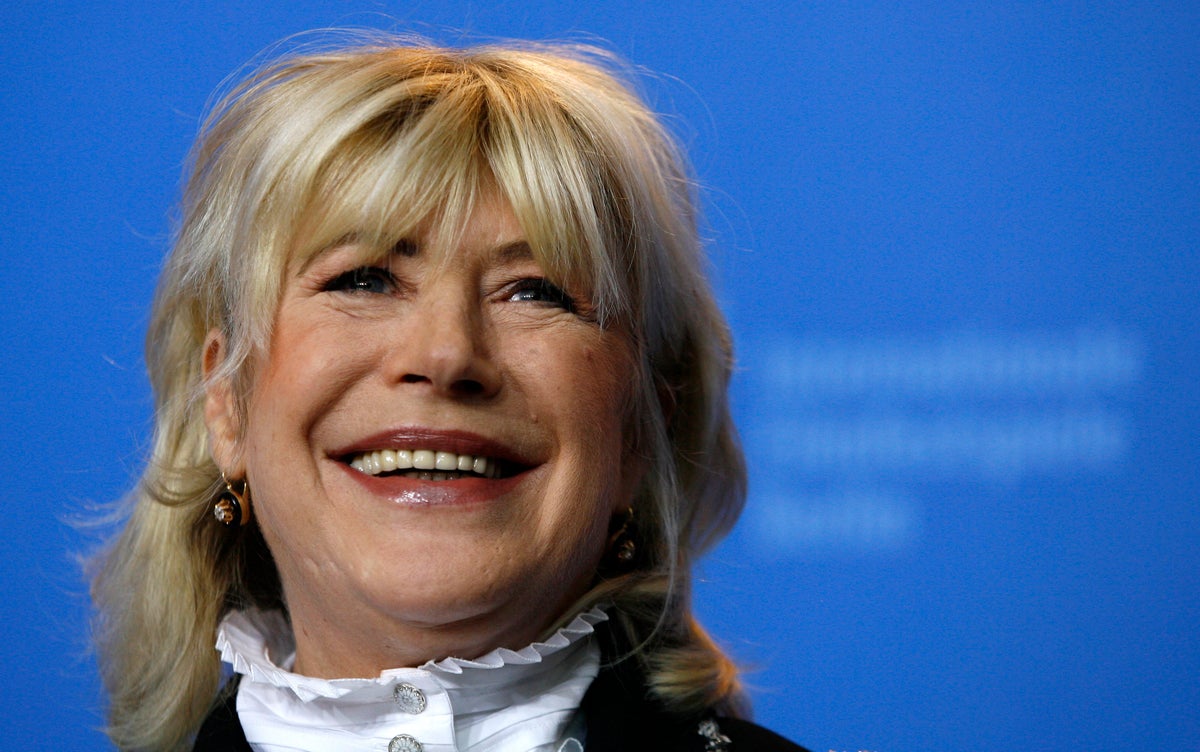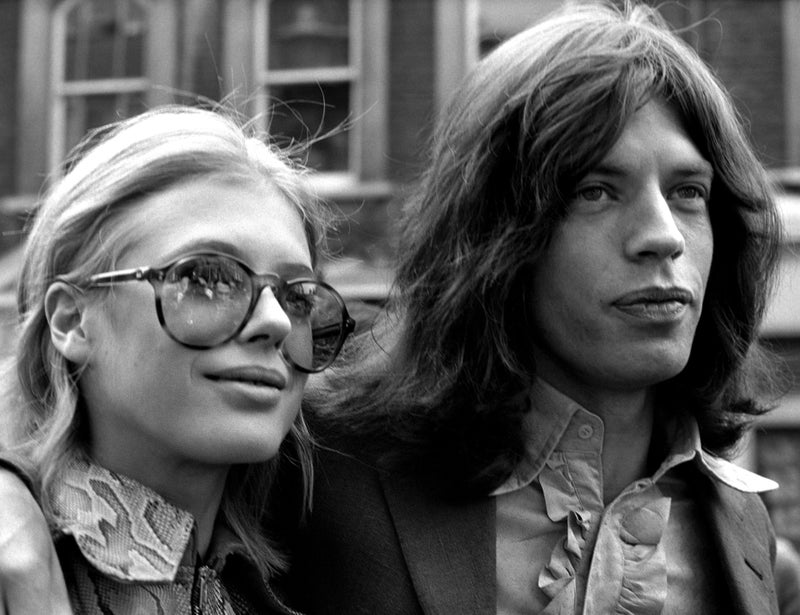Marianne Faithfull death: Leading light of the Swinging Sixties dies aged 78
Marianne Faithfull death: Leading light of the Swinging Sixties dies aged 78
Share:
Singer and actor made headlines for her romance with Mick Jagger but proved herself as an artist in her own right, as well as a survivor who prevailed over tabloid scrutiny, addiction, an eating disorder and cancer. Marianne Faithfull, the English rock singer who became one of the leading female artists of the British Invasion during the Swinging Sixties, has died aged 78. The news was confirmed by her spokesperson, who said in a statement: "It is with deep sadness that we announce the death of the singer, songwriter and actress Marianne Faithfull.
![[Faithfull and Jagger on their way to Marlborough Street Court on a charge of possessing cannabis, 1969 (Photo by Michael Webb/Keystone/Getty Images)]](https://static.independent.co.uk/2024/12/12/12/GettyImages-3294472.jpg)
"Marianne passed away peacefully in London today, in the company of her loving family. She will be dearly missed.". Born in Hampstead, London, to a Viennese mother with links to Austrian nobility and an MI6 agent who abandoned the family when she was six, Faithfull first began performing as a singer in 1964. She was introduced to Mick Jagger at London’s Indica Gallery, co-owned by her first husband, the artist John Dunbar, and began her association with the Rolling Stones when she recorded “As Tears Go By”. Written by Jagger, Keith Richards and Stones manager Andrew Loog Oldham – who dismissed Faithfull as “an angel with big tits” but thought he could make her a star – the song made the Top 10 in the UK.
![[Marianne Faithfull with Anita Pallenberg at Heathrow Airport, 1967]](https://static.independent.co.uk/2024/12/12/12/newFile-9.jpg)
When her marriage to Dunbar collapsed, she moved in with Brian Jones and Anita Pallenberg and began a relationship with Jagger, becoming a frequent target of the tabloids, not least during the infamous drugs bust at Richards’ Sussex mansion in 1967, when her singing career ground to a halt. “They hurt my feelings, all those busts and harassment,” she told The Independent in a 2008 interview. “I’m not saying I behaved that well, but I didn’t really do anything that terrible either.”.
![[Marianne Faithfull with her son, Nicholas, in 1967]](https://static.independent.co.uk/2024/12/12/13/newFile-1.jpg)
That same year, she launched an acting career with her debut theatre appearance in a stage adaptation of Chekhov’s Three Sisters at the Royal Court Theatre, opposite Glenda Jackson, and in Michael Winner’s comedy-drama I’ll Never Forget What’sisname opposite Orson Welles and Oliver Reed. A year later, Faithfull suffered a miscarriage of her and Jagger’s child, and their relationship ended. By the time he left her, she had also lost custody of her son, Nicholas, her son by Dunbar, along with the credit for her bleak 1969 song “Sister Morphine” – ostensibly because the Stones feared she would spend any money it made on drugs (her name was finally reinstated in the Nineties).
![[Marianne Faithfull with her first husband, John Dunbar, 1965]](https://static.independent.co.uk/2024/12/12/12/newFile-10.jpg)
Hitting rock bottom, Faithfull spent two years living on the streets of Soho while suffering from heroin addiction and anorexia. “It’s very, very strange to think about it,” she told The Guardian in 2007. “It was such a degraded moment, to live on a wall and shoot drugs.” Yet she insisted it was “exactly what I needed at that time… It was complete anonymity. I wanted to disappear – and I did.”.
![[Faithfull poses for a portrait session to promote her movie ‘Irina Palm’ at the 57th Berlin International Film Festival, 2007]](https://static.independent.co.uk/2024/12/12/13/newFile-3.jpg)
In a 2009 interview with director Mike Figg for the book Destroy/Rankin, Faithfull elaborated on how being exposed to scrutiny as a woman in the public eye had a lasting impact on her sense of self, to the point that she couldn’t bear to see herself in photographs. “When you are 18, 19, 20, you’re used to being photographed all the time, in a certain way,” she said. “So, the narcissism becomes almost out of control. And the way that young women are photographed, they become addicted to this feedback of the image. I’m still dealing with it.” She was contemptuous of her status as a “muse” to rock stars, too: “That’s a s*** thing to be,” she scoffed in a Guardian interview. “It’s a terrible job. You don’t get any male muses, do you? Can you think of one? No.”.
After an intervention from friends, she was enrolled in an NHS treatment programme for her heroin addiction. She was a survivor who suffered three miscarriages, breast cancer, hepatitus C and Covid-related pneumonia, and whose famous words uttered as she recovered from a drug-induced coma in 1969 – “wild horses couldn’t drag me away” – inspired the Rolling Stones song. “I see myself as strong, terrifically strong,” she told The Independent. “I mean, I’ve survived, haven’t I?”.
The destructive path she’d been on, which those watching had struggled to make sense of, was explained to her years later, when she received further treatment for a sleeping pill addiction at Crossroads, the rehab clinic founded by Eric Clapton. “I was told that I had very likely been clinically depressed for a long, long time, probably since I was 15, or even 14,” she said. “It explained, to me at least, a lot of my behaviour over the years.”.
She made a triumphant return to music in 1979 with Broken English, a critical and commercial hit that earnt her a Grammy nomination for Best Female Rock Vocal Performance. “I made a decision to really, completely give my heart to the whole thing, and that’s what happened,” she told The Guardian in 2021. “I was quite smart enough to realise that I had a lot to learn… I didn’t go to Oxford, but I went to Olympic Studios and watched The Rolling Stones record, and I watched The Beatles record as well,” she continued. “I watched the best people working and…because of Mick, I guess, I watched people writing, too – a brilliant artist at the top of his game. I watched how he wrote and I learnt a lot, and I will always be grateful.”.
-has-died-at-the-age-of-78.jpeg?auto=webp&width=800)





















